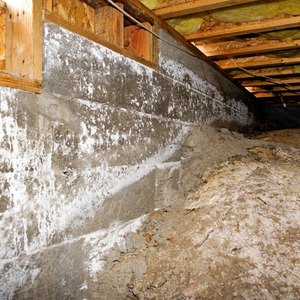
Mold can take hold in a damp or wet area of a property, quickly growing and producing mycotoxins, irritants and allergens that can cause allergic reactions in humans, according to the Environmental Protection Agency. Mold remediation removes both the mold and the problems that led to the growth of the mold. While most businesses can deduct mold removal expenses on their tax return, most homeowners cannot take a federal tax deduction for the costs of mold remediation.
Tips
Although mold remediation expenses are commonly deductible by businesses, homeowners may not be able to deduct similar expenses unless the mold appeared after a major natural disaster.
Mold Deductions for Homeowners
The IRS does not allow homeowners to deduct mold remediation costs in most situations, because it is seen as an everyday repair. Removing mold keeps your house habitable just like painting the home does, and you cannot deduct these expenses. The situation is different if the mold can be classified as a casualty loss, for example, if you did not already have mold in your home and experienced a sudden and unexpected event that causes the mold to develop, such as a flood or a hurricane. The key words here are "sudden" and "unexpected." You cannot deduct the cost of removing mold that has built up gradually over time.
Businesses Deduct as an Ordinary Expense
Taxpayers can deduct all mold remediation expenses related to repairing a property to undamaged condition as an ordinary business expense if they use the property to carry out a trade, such as in the case of a rental property or a retail store, per IRS Ruling 200607003. For a business owner to qualify, the mold problem must have developed after the business owner either purchased or started to lease the property. Remediation expenses for pre-existing mold conditions that a businessperson did not notice when he first leased or purchased are not tax deductible.
Claim the Same Year
Both homeowners and businesses claim their expenses for mold remediation in the years in which they paid for repair. Occasionally, a homeowner in a federally declared disaster area can amend an earlier year's return to apply a deduction to it; check IRS rules if this applies to you. Taxpayers should wait to see if they receive compensation from their insurer before claiming a deduction, because they will have to reduce the allowed deduction for repairs by the amount that their insurer compensates them.
How to Claim a Deduction
Homeowners with casualty losses and small businesses must complete IRS Form 4684 to report their losses and claim their deduction. Individuals will fill out Section A, while businesses will complete Section B. After finishing the form, individuals, sole proprietors, S-corporations and partnerships can carry over their allowed deduction onto line 28 of Form 1040, Schedule A. Corporations will report their mold remediation costs on line 14 of Form 1120.
References
- Internal Revenue Service: Topic 515 - Casualty, Disaster, and Theft Losses (Including Federally Declared Disaster Areas); February 2011
- TurboTax: Home Improvements and Your Taxes
- Harper, 2019.
- Howard, 2019.
- FEMA. "National Flood Insurance Program Fact Sheet." Accessed Jan. 23, 2020.
- FEMA. "The BIG Cost of Flooding." Accessed Jan. 23, 2020.
Writer Bio
Chris Hamilton has been a writer since 2005, specializing in business and legal topics. He contributes to various websites and holds a Bachelor of Science in biology from Virginia Tech.

